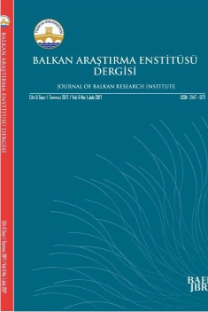TÜRK-YUNAN İLİŞKİLERİ: 1999-2010
TURKISH-GREEK RELATIONS: 1999-2010
___
- Akgönül, Samim, Türkiye Rumları: Ulus-Devlet Çağından Küreselleşme Çağına Bir Azınlığın Yok Oluş Süreci, (çev) Ceyla Gürmen, 1. Baskı, İletişim Yayınları, İstanbul, 2007.
- Anagnostou, Dia, "Deepening Democracy or Defending the Nation? The Europeanization of Minority Rights and Greek Citizenship", West European Politics, Vol. 28, No. 2, March 2005, pp. 335-347.
- Anastasiou, Harry, "Changing Greek-Turkish Relations: Past, Present and Future, Paper presented at the annual meeting of the ISA's 50th Annual Convention "Exploring The Past, Anticipating The Future", New York Marriott Marquis, New York City, NY, USA, Feb 15, 2009, pp. 1-25.
- Aydın, Mustafa, "Crypto-optimism in Turkish-Greek relations. What is next?", Journal of Southern Europe and the Balkans, Volume 5, Nr. 2, August 2003, pp. 223-240.
- Aydın, Mustafa and Sinem A. Açıkmeşe, "Europeanization through EU conditionality: understanding the new era in Turkish foreign policy", Journal of Southern Europe and Balkans, Volume 9, Nr. 3, December 2007, pp. 263-274.
- Bahcheli, Tozun, "Cycles of Tension and Rapproachment: Prospects for Turkey's Relations with Greece", in Tareq Y.Ismael and Mustafa Aydın (eds), Turkey's Foreign Policy in the 21st Century: A Changing Role in World Politics, 2003, pp. 161-179.
- Couloumbis, Theodore A. and Alexander E. Kentikelenis, "Greek-Turkish Relations and the Kantian Democratic Peace Theory", Southeast European and Black Sea Studies, Vol. 7, Nr. 4, December 2007, pp. 517-532.
- Clogg, Richard, A Concise History of Modern Greece, Cambridge University Press, 1992.
- Çarkoğlu, Ali and Kemal Kirişçi, "The view from Turkey: perceptions of Greeks and Greek-Turkish rapproachment by the Turkish public", Turkish Studies, Vol. 5, No. 1, May 2004, pp. 117-153.
- Düzgit, Senem Aydin, Seeking Kant in the EU's Relations with Turkey, TESEV Publications, December 2006.
- Evin, Ahmet, "Changing Greek Perspectives on Turkey: An Assessment of the post-Earthquake Rapproachment" in Ali Çarkoğlu, Barry Rubin, Greek Turkish Relations in an Era of Détente, 2005, pp. 4-20.
- Fırat, Melek, "Yunanistan'la İlişkiler", Baskın Oran (ed.), Türk Dış Politikası: Kurtuluş Savaşından Bugüne Olgular, Belgeler, Yorumlar 1919- 1980, Cilt I, 6. Baskı, İstanbul, 2002, pp. 344-346; 576-614, 716-768.
- __________, "Yunanistan'la İlişkiler", Baskın Oran (ed.), Türk Dış Politikası: Kurtuluş Savaşından Bugüne Olgular, Belgeler, Yorumlar 1980- 2001, Cilt II, 6. Baskı, İletişim Yayınları, İstanbul, 2002, pp. 102-123.
- Gürel, Ş. Sina, "Turkey and Greece: a Difficult Aegean Relationship" in Canan Balkır, Allan M.Williams (eds), Turkey and Europe, 1993, pp. 161- 190.
- Kelly, Judith G., "Introduction", Ethnic Politics in Europe: the Power of Norms and Incentives, Princeton University Press, 2004.
- Kubicek, Paul, "The European Union and Grassroots Democratization in Turkey", Turkish Studies, Vol. 6, No. 3, 2005, pp. 361-377.
- Oğuzlu, Tarık, "How Encouraging is the Latest Turkish-Greek Reconciliation Process?", Journal of Contemporary European Studies, Vol. 12, Nr. 1, April 2004, pp. 93-107.
- Öniş, Ziya and Şuhnaz Yılmaz, "Greek-Turkish Rapprochement: Rhetoric or Reality?", Political Science Quarterly, Vol. 123, Nr. 1, 2008, pp. 123- 149.
- Oran, Baskın, Türk-Yunan İlişkilerinde Batı Trakya Sorunu, Bilgi Yayınevi, 2. Basım, Ankara,1991.
- Putnam, Robert D., "Diplomacy and Domestic Politics: The Logic of TwoLevel Games", International Organizations, 42 (Summer 1988), pp. 427- 460.
- ISSN: 2147-1371
- Yayın Aralığı: 2
- Başlangıç: 2012
- Yayıncı: TRAKYA ÜNİVERSİTESİ BALKAN ARAŞTIRMA ENSTİTÜSÜ
BULGARİSTAN TARİH DERS KİTAPLARINDA TÜRK AZINLIĞIN YERİNE İLİŞKİN BAZI GÖZLEMLER
DEVLET-TOPLUM İLİŞKİSİ YAKLAŞIMIYLA BULGARİSTAN'DAN 1989 ZORUNLU GÖÇÜ
TÜRK-YUNAN İLİŞKİLERİ: 1999-2010
OSMANLI KAYNAKLARINA GÖRE KÜLTÜR MERKEZİ KONUMUNDAKİ MAKEDONYA ŞEHİRLERİ VE ÖZELLİKLERİ
VENELİN GANEV'İN TRAKYA'DAKİ ESKİ ESERLERLE İLGİLİ RAPORU (1913)
